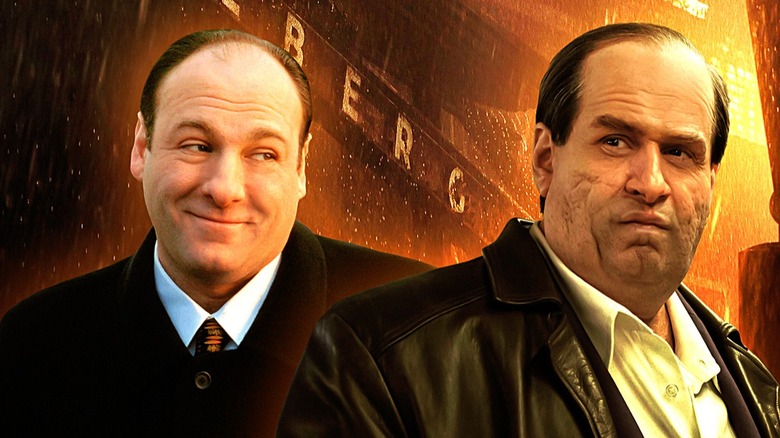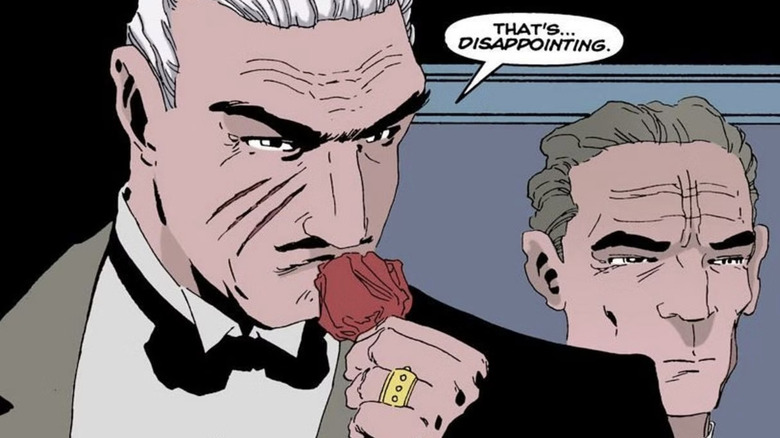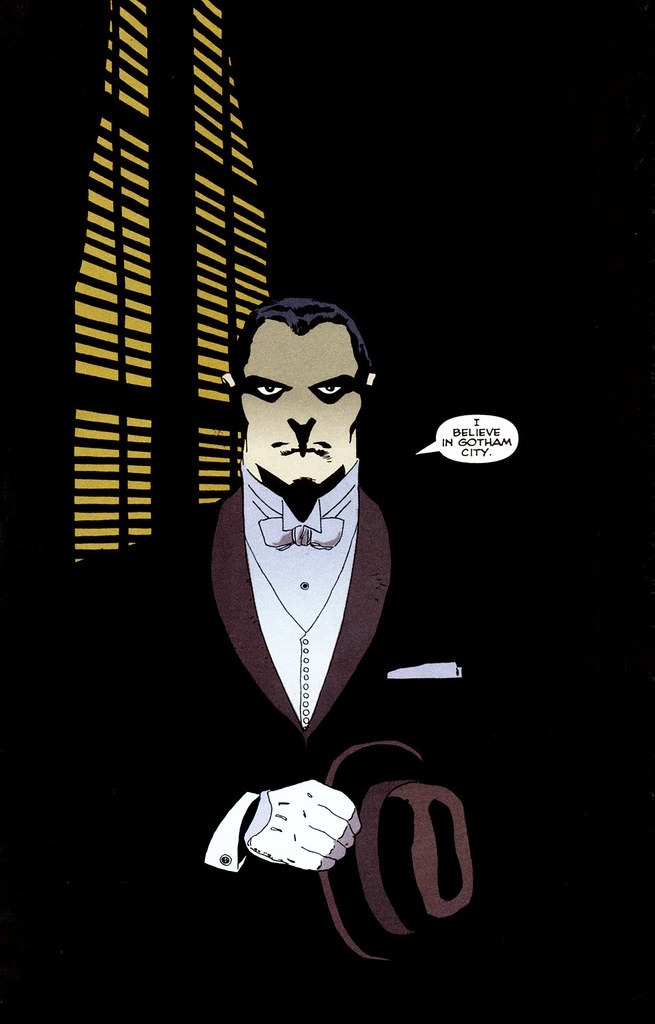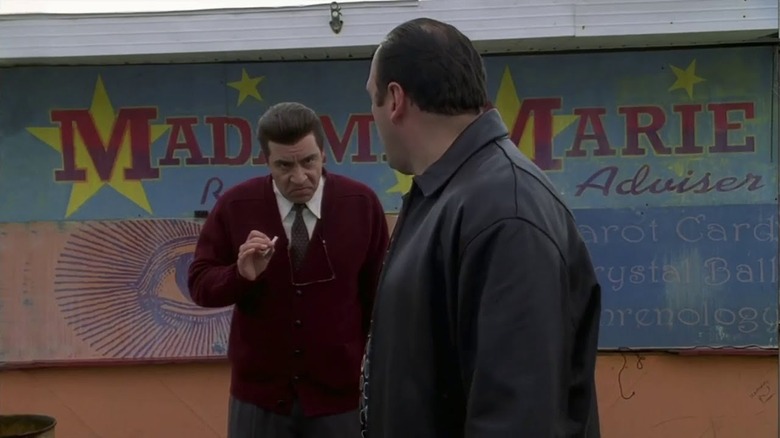The Penguin's Many Sopranos References Continue An Old Batman Trend
Thanks to the movies, superheroes are a cultural force. That glut hasn't exactly come with critical respect for the genre, though. On one hand, it's because these are innately simple stories for children. The other reason, I feel, is because the people who make these movies are embarrassed by that fact. Sometimes that manifests like in the "X-Men" films, where the movies run as far away from the comics as possible to "elevate" the story. Then there's the Marvel Cinematic Universe, which undercuts all its weirdness with "self-aware" humor about how none of its own world makes sense. Some rare filmmakers take superheroes seriously enough without trying to make them into something they're not (e.g. Sam Raimi) but it's rare.
The latest example of this is "The Penguin" showrunner Lauren LeFranc downplaying the series' Batman roots. No, this is a serious crime drama, hence why Oz (Colin Farrell) can't actually be called the "Penguin" even if he waddles like one onscreen. "The Penguin" is looking not towards DC Comics history for inspiration, but to the most seminal HBO TV series of all: "The Sopranos."
I wasn't expecting just how heavily "The Penguin" pilot would lean on "The Sopranos." Farrell's Joisey accent from "The Batman" has morphed into a near James Gandolfini impression. Oz doesn't have to deal with just rival gangsters, but also his vicious mother (Deirdre O'Connell), just like the biggest thorn in Tony Soprano's side was his mother Livia (Nancy Marchand). Oz also recruits young Gotham criminal Victor Aguilar (Rhenzy Feliz) as his wingman, a la Tony's mentorship of Christopher Moltisanti (Michael Imperioli). Speaking of, Michael Zegen as short-lived Alberto Falcone also seems to be channeling Imperioli in his performance.
But this isn't the first time a Batman story has modeled itself on a famous crime epic. Jeph Loeb and Tim Sale's 1996 mini-series "Batman: The Long Halloween" transparently apes "The Godfather."
Batman: The Long Halloween is based on The Godfather
Carmine Falcone and his slow nephew John Viti (reimagined as a Johnny Sack-esque underboss, played by Michael Kelly, in "The Penguin") first appeared in Frank Miller and David Mazzucchelli's "Batman: Year One." However, "The Long Halloween" is the book that defined the Falcone and his place in Batman mythos.
Loeb and Sale decided to complete the bridge that "Year One" built, showing how Gotham's old mafiosos got displaced by the supervillain freaks. So, they brought back Falcone and introduced his children: Sofia and Alberto. Mazzucchelli had already drawn Carmine looking a bit like Marlon Brando as Vito Corleone, so Sale leaned into that. (The big physical difference is that Carmine has three claw scars on his cheek, a gift from Selina Kyle.)
In "The Long Halloween," Alberto is modeled on Fredo Corleone (John Cazale); he's sullen, unmasculine, and the family black sheep, not a cocky alcoholic like the Chris-Ta-Fuh lite version in "The Penguin." Sofia is played by Cristin Milioti in "The Penguin." Like the comic, she's ruthless, violent, and short-tempered, but Milioti is small and waifish. Comic Sofia is tall and burly; her temper and build have gotten her described as a female Sonny Corleone (James Caan). Loeb and Sale's sequel, "Batman: Dark Victory," completed the triptych by introducing Mario Falcone, Carmine's once-exiled son, and a Michael Corleone (Al Pacino) analog.
It's not just the mob family dynamics that "Long Halloween" takes from "The Godfather," though. The series opens with Bruce Wayne attending a wedding held by the Falcones. While in Carmine's office, he declares, "I believe in Gotham City."
The homage has a deeper meaning (Batman's whole purpose is to save the soul of his corrupted city), but the influence of "The Godfather" couldn't be more obvious.
In "The Long Halloween" issue #9, gangster Sal Maroni visits his retired father Luigi for advice, who tells him "You can act like a man!" — the same angry advice Vito Corleone gave Johnny Fontane (Al Martino). As Luigi picks tomatoes from his garden (Gregory Wright's coloring makes the fruit look almost orange), he's shot by the unseen Holiday killer.
The Sopranos changed gangster cinema for a post Godfather world
Crime movies are technically genre pictures, but do them right and they can carry prestige. "The Godfather" is a signature achievement of the New Hollywood; Loeb and Sale aped it to give their comic the "seriousness" of a great film. In turn, "The Sopranos" was a turning point in TV, and one that deconstructed the prestige of "The Godfather."
The mafia life in "Godfather" films is filled with dirty business and messy deaths, but it's carried with the weight and classiness of an epic tragedy. "The Sopranos" is grimier and often anticlimactic; these thieves have no honor, killing and backstabbing each other for the pettiest of reasons. Tony Sopranos and his ilk want to live like they're in "The Godfather." They constantly reference the "Godfather" movies, Christopher's draw to the gangster life is intertwined with his fantasies of making movies, and even the innocent Meadow Soprano (Jamie Lynn-Sigler) thinks Sharon Stone looks cool as hell in "Casino." But real criminals are not like the kinds you see in the movies and so "The Sopranos" instead shows only the ugliness of "their thing."
"The Sopranos" is the defining gangster story of the 21st century, like "The Godfather" was of the 20th. So, in a post "Sopranos" world, a crime drama series striving to be taken seriously — as "The Penguin" is — pulls from David Chase, just like earlier Batman storytellers looked to Francis Ford Coppola.
"The Penguin" airs on HBO and streams on Max, with new episodes premiering every Sunday.



